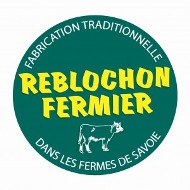
Farm made cheese is a designation which describes the cheeses made directly in the farm. Farm made cheese is made by the farmer, with the milk produced on their own exploitation.
According to the regions and the varieties of cheese, the traditions of the farm dairy have remained the most important.
Farm made cheese represents today, less than 8% of the production of AOC cheeses, and less than 1% of the total cheese production in France.
It is amongst the goat’s cheeses that the production of farm made cheeses is the most proportional with 1/3 of the production of AOC cheeses, and notably:
*100% of the AOC Chevrotin des Aravis or des Bauges with 34 farm producers
* 14% of the AOC Banon de Banon with 17 farm producers
* 6% of the AOC Chabichou du Poitou with 6 farm producers
* 28% of the AOC Crottin de Chavignol with 69 farm producers
* 66% of the AOC Pélardon with 75 farm producers
* 34% of the AOC Picodon with 124 farm producers
* 41% of the AOC Pouligny Saint-Pierre with 16 farm producers
* 37% of the AOC Rocamadour with 38 farm producers
* 34% of the AOC Saine-Maure-de-Touraine with 58 farm producers
* 20% of the AOC Selles-sur-Cher with 28 farm producers
* 35% of the AOC Valençay with 26 farm producers.
For ewe’s milk cheese cheeses, the proportion of farm producers stands for only 2% of the AOC cheeses:
*14% of the AOC Brocciu with 66 farm producers.
* 8% of the AOC Ossau-Iraty with 155 farm producers.
There are no longer any farm producers of AOC Roquefort.
Farm produced cow’s milk cheeses represent 8% of the AOC cheeses:
* 35% of the AOC Abondance with 54 farm producers.
* 5% of the AOC Beaufort with 28 farm producers.
* 0,1% of the AOC Bleu d'Auvergne with one farm producer.
* 21% of the AOC Bleu de Sassenage with 9 farm producers.
* 0,1% of the AOC Brie de Meaux with 1 farm producer.
* 0,1% of the AOC Brie de Melun with 2 farm producers.
* 0,1% of the AOC Camembert de Normandie with 1 farm producer.
* 1% of the AOC Cantal with 96 farm producers.
* 0,1% of the AOC Chaource with 1 farm producer.
* 0,1% of the AOC Epoisses avec 1 farm producer.
* 0,1% of the AOC Fourme d'Ambert with 1 farm producer.
* 0,1% of the AOC Laguiole with 2 farm producers.
* 0,1% of the AOC Langres with 2 farm producers.
* 0,1% of the AOC Livarot with 1 farm producer
* 6% of the AOC Maroilles with 11 farm producers.
* 0,1% of the AOC Morbier with 2 farm producers.
* 9% of the AOC Munster with 98 farm producers.
* 30% of the AOC Coeur de Neufchâtel with 23 farm producers
* 2% of the AOC Pont l'Evêque with 4 farm producers.
* 19% of the AOC Reblochon with 161 farm producers.
* 45% of the AOC Saint-Nectaire with 260 farm producers.
* 100% of the AOC Salers with 92 farm producers but only 6 farm producers in the Salers Tradition with the Salers breed of cow.
* 21% of the AOC Tomme des Bauges with 22 farm producers.
There are no longer any farm producers for the AOC Bleu de Gex, Bleu des Causses, Comté, Fourme de Montbrison, Mont d'Or.
For Saint-Nectaire, there are still 260 traditional farm producers.
The farm producers look after the animals, produce the cheese and sell it on the commercial market. Certain farm dairies group together to commercialise the cheese because they don’t have the time to go to the markets, and often the clients are outside the areas of production. The milk collectors-affineurs sometimes group together to produce several cheeses of the same region. This activity is particular to France, notably around the mountains (Auvergne, Savoy, the Pyrenees) but also in the regions where there are many farm producers (Bougogne, Loire…)
Other than farm made cheeses, there is artisan cheese, a very small production, done with the milk from the local cows.
There is also the cheese dairy production, this is made with the milk of several farms, but always in a determined area. This production is mechanised and larger, although it is not completely mechanised. In this category are village dairies (Gruyeren Mont d’Or) or the co-operative cheese dairies ‘fruitieres’ in French (Comté).
Finally, industrial dairies negotiate large quantities of milk and standardise the fabrication, often using pasteurised milk. This results in‘dead’ milk which looses its aromas and the diverse flavours of its ‘terroir’ of production.
This is why Maison Androuet defends, and has done so for 100 years, all of the small farm producers, in an effort to protect the legacy of the traditional cheeses.